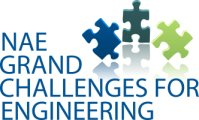Students from the University of Houston recently participated in a poster presentation related to the National Academy of Engineering (NAE) Grand Challenges program, in which women engineering students chose to investigate critical areas of emphasis for engineers in the 21st century.
Students selected a topic of interest from among the list of challenges, explored issues related to solving the challenge, investigated the state of current research by scientists and engineers in the field, and gained an understanding of how the challenge impacts quality of life. The program gave freshman women the opportunity to discuss their progress with faculty mentors, and their findings were then summarized in a poster presentation at the Cullen College of Engineering.
Kathy Zerda, director of the Program for Mastery in Engineering Studies (PROMES), noted that the program participants acquired an academic advantage in critical thought, motivation, and presentation skills. "My perception is that these young women enjoy the opportunity to get to know a member of the engineering faculty outside of the classroom setting," she said. "They gain confidence by mastering information related to the challenge, and then presenting what they have learned to others. More significantly, they gain an appreciation for the engineering curriculum and how it relates to preparing them for making the world a better place."
Veronica By, a chemical engineering major, focused on finding practical ways to improve clean drinking water in Cambodia and other developing countries. By became involved in the NAE Grand Challenges project because it presented a great opportunity to promote women in engineering, and because her family is from Cambodia. "I wanted to focus on the troubles of what my country is facing and find ways to improve their difficulties," she said.
Mechanical engineering major Meghan Meriano chose fusion energy as her Grand Challenge topic. "I am interested in working with nuclear reactors on Navy vessels (fission energy), and I was interested to see what the difference between the two nuclear reactions were," she said. Meriano researched inertial confinement and focused on the National Ignition Facility (NIF) where many experiments and tests are being held to create small fusion reactions.
Cruz Guzman, a computer engineering student, was encouraged by Stuart Long, professor of electrical and computer engineering, to explore how scientists and engineers are trying to mimic the brain. By studying the work of Raymond Kurzweil, Guzman learned of the enormous potential in re-creating sensory in a prosthetic arm or leg as if it were real. "That is why I decided to do this research; it is so intriguing and there is so much to learn," she said. "Technology has no limits. Bringing the unbelievable to life to help others is what our society needs."
Mary Faltaous, an electrical engineering major, chose engineering better medicine. She researched a Houston-based company that has turned to engineering as a solution for epilepsy and drug-resistant depression.
Jessica-Renee Isidro, a biomedical engineering student, also studied engineering better medicines, specifically, better preventative measures and treatments for cervical cancer to address the issue of late-stage diagnoses despite regular screenings.
Electrical engineering major Sara Thomas studied nanotechnology as a means of water purification. She focused on the use of carbon nanotubes as filters, which are energy-efficient and highly effective at cleaning water.
